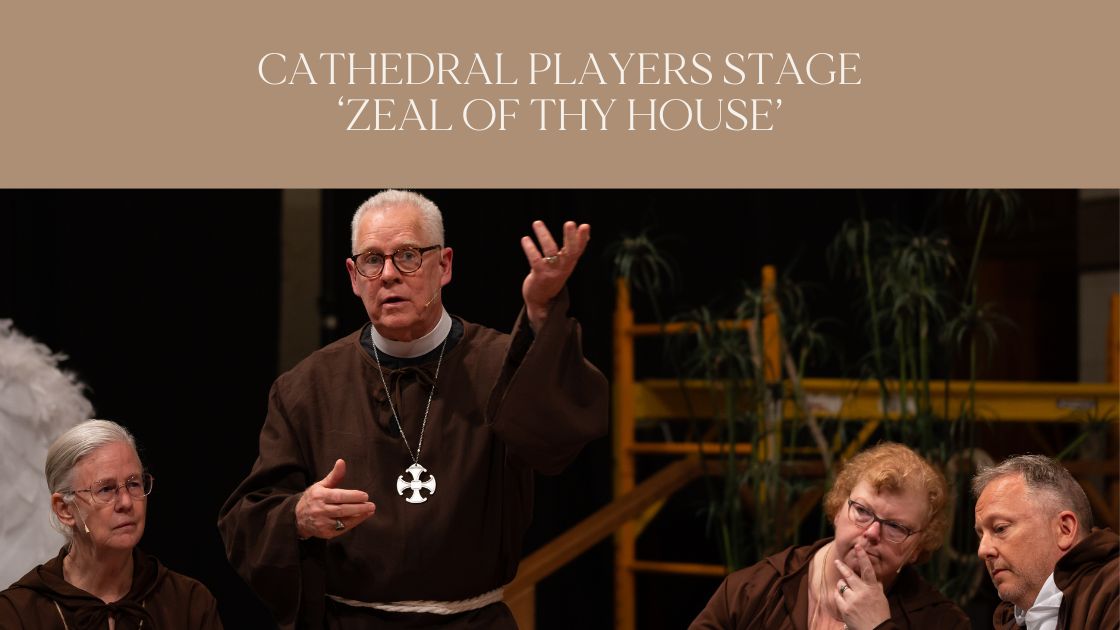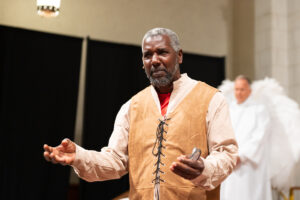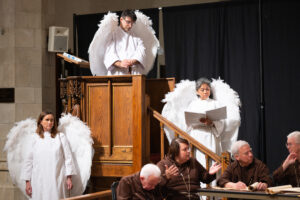
Under the direction of Dr. Marianne DiQuattro, the Cathedral Players staged their second play, Zeal of Thy House, at the Cathedral Church of St. Luke, Orlando, on May 12 and 13.
Dorothy L. Sayers, a British crime writer and poet who is known for the Lord Peter Wimsey mysteries, wrote the play. She took her inspiration from a monk’s account of the Canterbury Cathedral fire in 1174 and the subsequent rebuilding of the quire. In Zeal of Thy House, Sayers portrays William of Sens, the chosen architect, as eaten away by pride in his splendid work, unable to give glory to God for his achievement. The action occurs in the presence of a group of graciously influential archangels.

Bill Anderson portrayed architect William of Sens. | Photo Credit: Valerie Sims
DiQuattro, a member at the Cathedral, is also an associate professor of theater at Rollins College and artistic director at the Running Man Theatre in Orlando. She used an amateur cast and had a small role herself while following the medieval theater practice of typecasting.
“I asked Bill Anderson, owner of a construction company, if he would take on the part of William of Sens, and he enjoyed the parallels between his work and his character’s,” DiQuattro said. “Bill’s performance was extraordinarily powerful, and we were all joking that the Orlando Shakespeare Theatre would steal him from us! The Cathedral treasurer, Holly Vanture, played the role of Father Stephen in the play. Dean Reggie Kidd played the Lord Prior.”
The role of Father Prior was close to Kidd’s own at the Cathedral and, as such, was profoundly enriching for the dean. “Father Prior had to build consensus around restoring Canterbury Cathedral after the fire of 1174 while also attending to the spiritual needs of the people around him,” he said. “Those needs ranged from smug, superficial piety to half-baked repentance. None of his work was possible without divine intervention. It was a humbling exploration of my call to ministry.”
DiQuattro chose the play because the Cathedral had just finished an extensive capital campaign to replace the church’s windows.
“I was thinking about the constant ‘work’ of maintaining the visible church, the inheritance of a Cathedral building and how it is the work of many hands and minds to maintain its presence in a city and diocese,” she explained. “I thought it would be wonderful to bring this play to our Cathedral community, full of wonderful parishioners with a true ‘zeal’ for the Lord’s house—metaphorical and physical.”

Archangels (L-R): Barbara Rushing as Raphael, David DiQuattro as Michael, Ilona Hastie as Cassiel. Cathedral Chapter Members (L-R): Matt Gay as Father Ernulphus, Melissa Hunt as Father Theodatus, Scott Gabrielson as Father Wulfram and Holly Vanture as Father Stephen. | Photo Credit: Valerie Sims
Kidd believes the production was an overwhelming success. “So much positive energy within the cast, within the audience and between them brought about stimulating conversations about the artistry of the production and its message,” he said.
The Cathedral Players were in rehearsals for eight weeks, twice a week. Kidd held a six-week Sunday morning program in the Dean’s Hour to introduce the play, and a Wednesday evening class to read and discuss Letters to a Diminished Church, a collection of essays also written by Sayers.
Dr. Janice Brown, DiQuattro’s former professor, led a post-show discussion of the characters and themes of the play. “After the Sunday morning show, she gave an engaging talk about the connection between Dorothy Sayers’ early career as a mystery writer and her later career as a Christian dramatist and apologist,” Kidd said. “Janice Brown was able to tease out for us how significant the writing of this play was to Ms. Sayers herself.”
And the troupe may have plans to stage another play, DiQuattro said. “The show had been over only one day when the Cathedral Players were already emailing each other and asking what we might do next!”
The Cathedral Players began in October 2021 with a production of Christopher Marlowe’s The Tragical Historie of the Life and Death of Doctor Faustus, also directed by DiQuattro.
“I hope our Cathedral Players will be inspired by this recent effort to continue to extend in mission the extraordinary love of God in Christ,” Kidd said.
